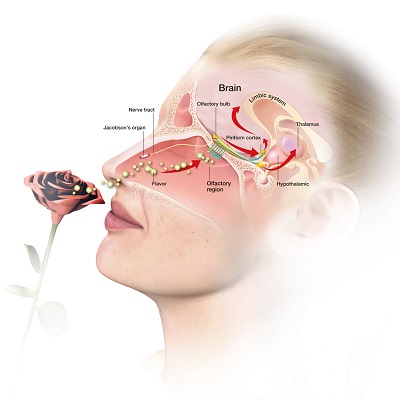 Essential oils have become a very popular way of using nature to heal all parts of the body, but they’re particularly effective because of how they work for and with the brain. Let’s take a look at how essential oils work for the brain.
Essential oils have become a very popular way of using nature to heal all parts of the body, but they’re particularly effective because of how they work for and with the brain. Let’s take a look at how essential oils work for the brain.
The Scent Brain Connection
Have you ever noticed that when you smell a familiar scent, your mind takes you right back to a memory associated with it? This sense, smell, olfaction, is an important way that we interact with the world. And when it comes to essential oils, this is powerfully true.
When you first inhale the smell of an essential oil, the small particles of the oil that are in the air actually are dissolved in the lining of your nose. When those particles meet receptors in the inside of your nose, they trigger nerves that send signals all the way to your brain.
That is how you begin to notice and recognize a scent. For example, you smell lavender essential oil and know that it is lavender because you’ve smelled it before. At the same time, different cells send signals to other areas of the brain.
These other areas are responsible for memory, mood, emotions, and drives. Aromatherapy, then, becomes a powerful tool for introducing essential oils into the body and brain and having an effect on health.
The Blood Brain Barrier
Another important property of essential oils is that they can pass through the blood brain barrier. Imagine that your brain has a filter surrounding it. Some molecules can pass through easily while others can’t pass at all.
This is a sophisticated system to protect the brain from molecules that could be harmful to it and allow essential molecules to enter. The molecules of essential oils are very tiny and they can easily pass through this barrier.
That’s one reason that when you open a bottle of essential oils you can begin to smell it, even across a large space, very quickly. The tiny molecules are easily absorbed into the air and into your nose.
Through aromatherapy essential oils will be quickly brought into the body. But they can also be delivered through the skin. The pores of the skin allow the essential oils to pass through the skin and into the bloodstream. From there they can pass throughout the body, including into the brain.
Essential Oils for the Brain
There are many essential oils that actually improve the function of the brain. For example, lavender, ylang ylang, and frankincense all work to reduce the effects of stress and worry. If you’re in a bad mood, using bergamot and orange can help improve the way you feel.
Essential oils have even been studied for dementia patients. Marjoram, patchouli, lavender, and vetiver have all been shown to help patients. One thing to note is that they work best applied to the skin in dementia patients.
If you struggle with memory and focus, rosemary, peppermint, and sandalwood are wonderful oils to use. You can diffuse these throughout the room or simply apply diluted oils to your temples or chest to get the aromatherapy effects.






